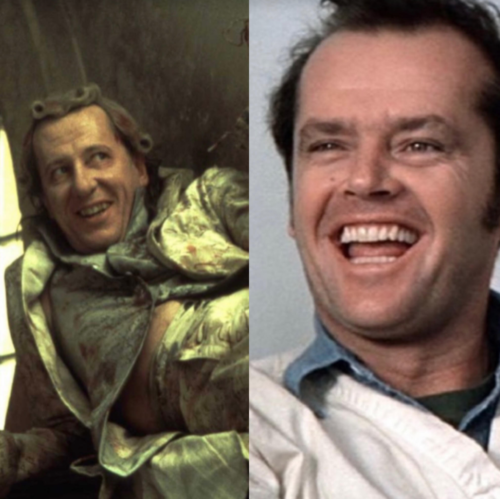In every “madhouse” (even though we’re all mad here on Earth), it seems as though there’s one “ringleader” who is a bit more “sane” than the others, and is only the ringleader precisely because of that virtue. What with having enough “shrewdness” left after being mind-fucked so much by a society that tells you you’re crazy for not having feelings that are in line with the “correct” decorum, it’s quite easy to take those whose brains have become even more fragile than yours and rile them up with your “wild” notions. This, to be sure, is the impression that both the Marquis de Sade (Geoffrey Rush) and Randle Patrick McMurphy (Jack Nicholson) in Quills and One Flew Over the Cuckoo’s Nest, respectively, give off to anyone monitoring them. And oh, how they are monitored.
While Philip Kaufman’s Quills sets its stage in post-French Revolution France at the real life Charenton insane asylum, Miloš Forman’s One Flew Over the Cuckoo’s Nest takes place in an unnamed hospital in Oregon (filmed at the Oregon State Hospital in Salem). Here, McMurphy makes his grand debut onto “the scene” after getting transferred from the prison where he was serving time for statutory rape (meaning he banged an underage girl), figuring the loony bin would be more cush than having to perform hard labor in the gulag.
Similarly, de Sade is only in the asylum because he has failed to conform to the societal expectations of repressing all traces of sexual desire, most especially in his writing. Yet, for a time, he has the “pleasant warden” that is Abbé du Coulmier (Joaquin Phoenix) to get him through what would ordinarily be the agonizing experience of institutionalization. With du Coulmier at the helm, though, he has all the comforts of his own chateau, between wine, books, and, of course, plenty of fresh ink and quills to write whatever “therapeutic” narrative he needs to–usually involving someone’s quim. That is, until his own personal Nurse Ratched (Louise Fletcher) comes along: Dr. Royer-Collard (Michael Caine). As iron-fisted and filled with malice for the patients as Ratched, he comes to view de Sade as public enemy number one just the way Ratched sees McMurphy.
With both of their penchants for rabble-rousing–their unique ability to inspire awe, therefore obedience in the fellow patients–de Sade and McMurphy are the veritable “kings” of the madhouses over which they reign. While de Sade views his fellow “inmates” as little more than potential cast members in whatever new lascivious play he’s concocted (concockted?), McMurphy sees them more as equals–“chums,” “drinking buddies” (minus the alcohol, unless it’s smuggled in), etc. He does not look down upon them as de Sade does, the latter being of the nobility and more learned than the others, therefore seeing a distinct and fundamental difference between himself and these loons. Well, that and his mind is perfectly well, he’s just proven a great embarrassment to his wife and family for speaking oh so frankly about sex and sadism in life and in print. Here, too, he bears a McMurphy parallel, for he’s only being institutionalized in lieu of imprisonment for his licentiousness–for that would be the more shameful option to those who must answer for de Sade.
Perhaps because of how self-superior de Sade is, this is why Quills doesn’t bother to name any of the other patients, save for Bouchon (Stephen Marcus), who will end up being a catalyst for the film’s most key incident. As for One Flew Over the Cuckoo’s Nest, each patient has a distinct personality carved out for them within the narrative, which is why they seem to warrant actually getting names, including Billy Bibbit, Charlie Cheswick, Martini, Dale Harding, Max Taber, Sefelt and Bruce Fredrickson, Scanlon and, of course, “Chief” Bromden. It is Chief who serves as the narrator in Ken Kesey’s book, while giving over most of the spotlight to McMurphy in the film. After all, the “instigator” is more interesting to observe in cinematic form, particularly ones so brazen as McMurphy and de Sade (oh and let us not forget Lisa Rowe in Girl, Interrupted).
Both arouse (no pun intended) conflict with regard to sexual matters (a.k.a. stirring up primal lust), with de Sade constantly regaling people with his tales and McMurphy smuggling in a pair of party girls while Ratched isn’t around. Their ability to get away with antics again and again also further contributes to their “legend” status within the institution. Alas, it is because of all that they’ve “gotten away with” before that their wardens end up smudging out their will tenfold after the proverbial “final offense” in the third act of the movie. De Sade and McMurphy, therefore, become prime examples–martyrs–of how mental institutions only further poison and sicken the psyche rather than healing it in any way whatsoever.
Ratched and Royer-Collard will both ultimately serve as the suppressors to “blow out the flame”–that last little shred of light–in the minds of these men. It must be done, after all, for they are “antagonizers” and “menaces” to society with their love of pleasure and their disregard for authority. And we certainly can’t have that in a place as “civilized” and “respectable” as Earth.




















